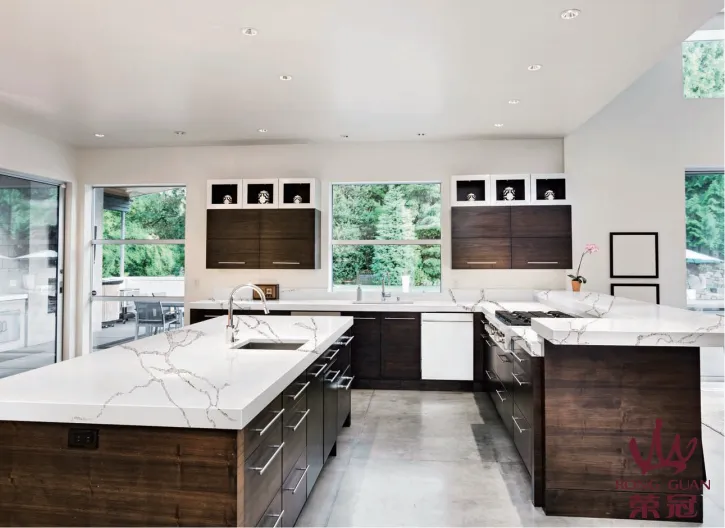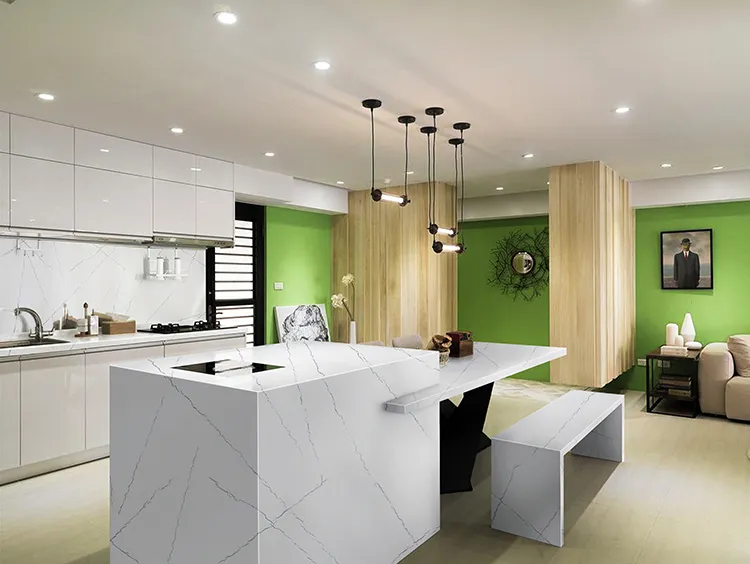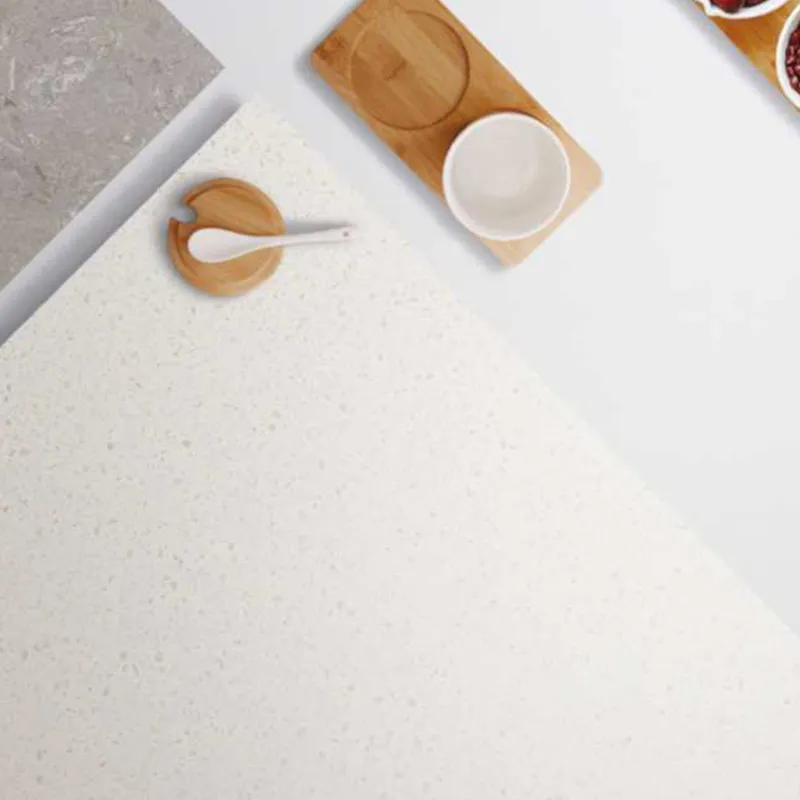As a modern building material that combines beauty and durability, quartz stone countertops are widely used in kitchens, bathrooms and other places due to their excellent properties such as high hardness, corrosion resistance, high temperature resistance and scratch resistance. However, with daily use and the passage of time, quartz stone countertops may become dull and lose their luster, which not only affects their beauty, but also reduces the visual effect of the entire space. How to effectively repair a dull quartz stone countertop and restore its luster is the focus of many families and property managers.
This article will analyze in detail the reasons for the dullness of quartz stone benchtops, repair steps, daily maintenance and other aspects to help readers master relevant repair skills.

What are the reasons for the dullness of quartz stone countertops?
Before delving into the repair methods, we first need to understand the reasons for the dullness of quartz stone countertops. Only by correctly identifying the factors that cause the dullness of the countertops can we prescribe the right medicine and carry out effective repairs. Here are some common reasons why quartz stone benchtops lose their luster:
1. Daily wear and tear
2. Improper cleaning
3. Chemical contamination
4. Scratches from hard objects
1. Daily wear and tear
Although quartz stone countertops have high hardness, long-term friction and contact in daily use will still cause slight scratches on their surface. These tiny scratches accumulate and gradually form a "matte" effect, making the countertop look less shiny.
2. Improper cleaning
Using detergents with strong acid or alkalinity for cleaning may corrode the quartz stone countertop and make it lose its original luster. In particular, some detergents with abrasive particles will cause small scratches on the surface if used frequently, which will eventually affect the overall brightness.
3. Chemical contamination
If some kitchen utensils or chemicals are splashed on the quartz stone countertop, if they are not cleaned in time, they may leave stains or traces of chemical reactions, causing the countertop to darken in part. Oil stains, acidic substances, alcohol, etc. are all common contaminants.
4. Scratches by hard objects
Despite the high hardness of quartz stone countertops, scratches may still appear on the surface when scratched by hard objects such as metal utensils and knives. These scratches are particularly obvious under light and gradually make the countertop lose its luster.

What are the steps to repair a dull quartz stone countertop?
After understanding the reasons for the dullness of the quartz stone benchtop, we can choose the appropriate repair method according to the specific situation. The repair steps mainly include four parts: cleaning, grinding, polishing and sealing.
1. Cleaning the quartz stone countertop
Before performing any repair operations, first make sure that the countertop is clean, because dust or dirt will interfere with subsequent processing steps. Here are some specific steps to effectively clean the quartz stone benchtop:
● Warm water and mild detergent: Use warm water and a mild neutral detergent to wipe the surface of the quartz stone benchtop, making sure to remove all oil, dust and food residues. Avoid using detergents that are too acidic or alkaline to prevent further damage to the countertop.
● Soft cloth: Use a soft cloth to wipe, and avoid using steel wool or other abrasive cleaning tools, as these tools may leave scratches on the quartz stone benchtop.
● Dealing with stubborn stains: For stubborn stains that are difficult to remove, you can use some special quartz stone countertop cleaners, or treat them with a solution of equal parts water and vinegar, then rinse thoroughly with clean water and wipe dry with a dry cloth.
2. Polishing the quartz stone benchtop
If the quartz stone benchtop has already been slightly scratched or dull, it needs to be repaired by polishing. Polishing is a job that requires careful work, because the hardness of quartz stone material is high, and the wrong polishing method may cause irreversible damage.
● Choose the right sandpaper: When polishing the quartz stone countertop, you should choose fine-grained sandpaper for polishing. Generally, it is recommended to use sandpaper between 300 and 600 grit for gentle hand polishing to remove fine scratches or surface oxide layers.
● Wet sanding: When sanding the quartz stone benchtop, it is best to use wet sanding. That is, add water continuously during sanding to reduce the friction heat between the sandpaper and the quartz surface and avoid the generation of dust. Wet sanding can not only improve the sanding effect, but also prevent secondary damage.
● Gradually increase the particle size: In order to obtain better results, sanding should be carried out in multiple stages, gradually increasing the particle size of the sandpaper. First use coarser sandpaper to remove obvious scratches, and then gradually switch to finer sandpaper to restore the smoothness of the quartz stone benchtop.
3. Polishing the countertop
After sanding, the quartz stone benchtop has restored its smoothness, but it still lacks gloss. At this time, it needs to be polished to make it shiny again.
● Use polishing agent: Choose a special quartz stone countertop polishing agent and apply it evenly on the countertop. You can use a sponge or a soft polishing cloth to gently rub in a circular motion to evenly distribute the polishing agent on the countertop.
● Electric polisher: If you need to deal with a larger countertop, using an electric polisher will save time and effort. Avoid over-polishing in the same place by constantly adjusting the polishing speed. The purpose of polishing is to remove small scratches left by the grinding process and improve the brightness of the quartz stone benchtop.
● Repeated polishing: Polishing is not a one-time job. It may take multiple polishings to restore the quartz stone countertop to its original luster. After each polishing, wipe the countertop with a clean cloth, observe the effect, and make adjustments as needed.
4. Seal the countertop
After grinding and polishing, although the quartz stone benchtop has been restored to its original luster, sealing is the last key step to ensure that the repair effect is long-lasting and improve the stain resistance of the countertop.
● Choose the right sealant: There are many sealants on the market that are suitable for quartz stone countertops. They can form a protective film on the surface of the countertop to resist stains and liquid penetration. It is especially important to choose a sealant that is waterproof and corrosion-resistant.
● Apply evenly: Use a sponge or clean cloth to apply the sealant evenly to the entire countertop, making sure to cover all areas. Be careful not to apply too much when applying, so as not to affect the sealing effect.
● Wait for drying: It usually takes several hours for the sealant to dry completely. During this period, avoid placing heavy objects or performing other operations on the countertop to avoid damaging the sealing effect.
● Repeat sealing: Depending on the frequency of use and environment, the sealing treatment of the countertop may need to be repeated regularly. Generally, it is recommended to seal every 6 to 12 months to ensure that the countertop remains in good condition.

Quartz stone countertop: daily maintenance and prevention
After repairing the quartz stone countertop, daily maintenance and preventive measures are also essential to prolong its gloss and beauty. Here are some effective maintenance suggestions:
Avoid using strong acid and alkaline cleaners
Try to choose neutral cleaners for daily cleaning and avoid strong acid or alkaline substances from contacting the countertop. Even though quartz stone is highly resistant to corrosion, long-term use of corrosive chemicals may still cause damage to the surface of the quartz stone benchtop.
Clean stains promptly
When encountering oil stains, acidic substances or other stains, wipe them clean immediately with clean water and soft cloth to avoid stains staying on the countertop for a long time, causing difficult-to-repair contamination.
Use cutting boards and heat insulation pads
Although quartz stone countertops are resistant to high temperatures, placing hot pots directly on the countertop may still cause local overheating, causing surface discoloration or cracking. Therefore, it is recommended to use heat insulation pads to protect quartz stone benchtops. In addition, avoid cutting food directly on the countertop. Using a cutting board can effectively prevent scratches.
Regular polishing and sealing
Quartz stone benchtops are regularly lightly polished and sealed to effectively maintain the gloss and durability of the countertop. The frequency of polishing depends on how often the countertop is used, and usually light polishing once a year is sufficient.

Looking for affordable building materials that don’t compromise on quality? Rongguan specializes in customized terrazzo flooring, quartz countertops, and roof tiles to meet your specific needs. Our factory-direct prices and commitment to excellence have made us a trusted supplier for clients worldwide. Get in touch today for tailored quotes and take advantage of our latest promotions!

